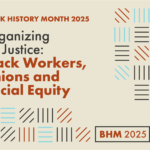
Top 10 things Canadian unions want to see in the federal budget
Early next week, the federal Liberal government will table their first budget. This is an historic opportunity for our government to respond to the jobs crisis, while also beginning to repair services and programs that Canadians rely on.
Working Canadians and their families are facing a precarious economic picture, but Canada is well-positioned to turn things around. Last October, the Liberals were elected precisely because they recognized this picture and promised to be bold in addressing it.
Here are the top 10 things Canadian unions will be looking for in next week’s federal budget:
1. Strategic infrastructure investment
Making targeted and strategic investments in infrastructure is one of the best things our government can do to create jobs, stimulate our economy, and tackle climate change.
Unions are urging the government to act on its election promises to invest in infrastructure, especially public transit infrastructure, affordable housing, and social infrastructure like seniors’ and child care facilities.
2. Employment Insurance fixes
Employment Insurance is a critical lifeline for unemployed workers and their communities. But unfortunately, Conservative changes have meant it’s not always accessible to the unemployed workers who need it, where and when they need it.
Fixing Employment Insurance is actually one of the best things we can do for economic stimulus, because unemployed workers get and spend EI benefits in their local communities within weeks.
Much has to be done to bring back the EI benefits where they should be to help Canadian workers. Here are just a few things the government could do to immediately improve our EI system:
- Eliminate the 910-hour eligibility hurdle for new labour force entrants and re-entrants;
- Reverse the Conservatives’ 2012 changes creating separate categories for claimants based on past history of claims, and changing the definition of suitable employment and reasonable job search efforts; and
- Reverse cuts to front-line services, which have been causing long delays accessing benefits.
3. Skills training and workforce development
Canadian unions were encouraged by the government’s election commitments to develop our workforce by helping more Canadians, particularly young people, access skills training. Some key commitments include the following:
- Invest $300 million annually in the Youth Employment Strategy, create at least 40,000 youth jobs a year, and develop or expand Pre-Apprenticeship Training Programs;
- Invest $500 million more each year in training EI-eligible individuals through the provincial and territorial Labour Market Development Agreements; and
- Invest $25 million each year for union training facilities.
Women continue to be underrepresented in skilled trades, making up only three percent of registered apprentices in construction, automotive and industry trades. Federal infrastructure projects are a perfect opportunity for government to work with unions and industry leaders to remove barriers and create opportunities for women in skilled trades.
4. Health care to meet the needs of our aging population
Canadians need urgent action on health care, to meet the challenges of an aging population and begin to undo the damage of more than $36 billion in Conservative cuts. The Canadian Labour Congress is calling on the federal government to do the following:
- Commit to funding at least 25 percent of health care costs by 2025;
- Work with stakeholders to develop a national seniors’ strategy, including home care, long-term care and community support services;
- Develop a national prescription drug program, which could reduce total spending on drugs by as much as $11 billion while fulfilling a vital need among elderly and other vulnerable Canadians; and
- Recruit, train and retain more health care workers to ease wait times.
5. Investment in child care
The high cost of child care and lack of licensed spaces mean that too many Canadian families are being squeezed. Investments in child care can create jobs and help parents, particularly mothers, to re-enter the workforce.
Canada’s spending on early childhood education and care falls far behind that of other OECD countries, but the upcoming federal budget can start to change that, by making immediate, modest investments in child care.
The labour movement has called on the federal government to work with the provinces and territories to develop and fund a common, robust early learning and child care framework. In the 2016 budget, the federal government can allocate targeted federal funding to provinces and territories to build universal, comprehensive, high-quality systems. With funding, provinces and territories could begin to address affordability, support child care workers by raising low wages in the sector, and meet the needs of hard-to-serve populations, such as families with children with disabilities, and refugee and newcomer families.
6. Measures to tackle child poverty
Over 1.3 million Canadian children live in poverty, including 40 percent of Indigenous children. The simple reality is that children live in poverty because their families live in poverty.
The federal government needs to develop a national anti-poverty strategy tackling the many causes of child poverty, including persistent unemployment, the proliferation of insecure jobs, and stagnant wages. Fixing Employment Insurance, creating jobs through infrastructure and other strategic investments, and improving access to child care – as outlined above – are just some of the ways our government can begin to lift children, and their families, above the poverty line.
7. Truth, reconciliation and justice for First Nations
During the election, the government committed to a renewed, nation-to-nation relationship with Indigenous peoples. There is much work to be done to get to that point, and to enact all the recommendations of last year’s Truth and Reconciliation Commission final report.
In its pre-budget submission to government, the Canadian Labour Congress identified drinking water and sanitation in Indigenous communities as a key infrastructure priority, saying that “It is unacceptable that, in a nation as wealthy as ours is, this critical necessity is not available to all.”
Unions will also be watching for new funding for First Nations’ child care programs, education and skills training, as well as adequate funding for the National Inquiry on Missing and Murdered Indigenous Women.
8. Help for seniors in poverty
Right now, one in nine Canadian seniors live in poverty. Retirement after a lifetime of hard work shouldn’t mean unbearable financial struggle. Expanding the Canada Pension Plan is still crucial; but in the short term, increasing the Guaranteed Income Supplement for single, low-income seniors by 10 percent, as promised in the last election, would be a significant move to help address seniors’ poverty.
9. Literacy investments
Research by the TD Bank Financial Group suggests that the economy-wide impact of raising average literacy levels would be tremendous. Even a 1 percent improvement in literacy rates nationally would boost our economy by $32 billion.
The Conservative government allowed the Office of Literacy and Essential Skills to lapse funding every year. This funding should be restored immediately.
In addition, Canadian unions are urging the government to speed up special investments to support Syrian refugees in need of language training, literacy and other basic employment support programs to help them succeed in Canada’s workforce.
10. Action on climate change
Canadian unions have been working with environmental, Indigenous, faith and community groups since 2009 to develop a “One Million Climate Jobs” plan for Canada.
Through strategic infrastructure investments in public transit, renewable energy and green building retrofits, the federal government could create more than one million climate jobs and reduce Canada’s greenhouse gas emissions by one-third over 10 years. The plan also includes a just transition to help workers affected by climate change move into new economic growth sectors.
Of course, these are only some of the issues that affect working Canadians. The Canadian Labour Congress’ submission to the government’s pre-budget consultation sums it up: on March 22, Canadian unions will ultimately be looking for real, progressive change aimed at “building a fairer and more prosperous Canada” for all.





